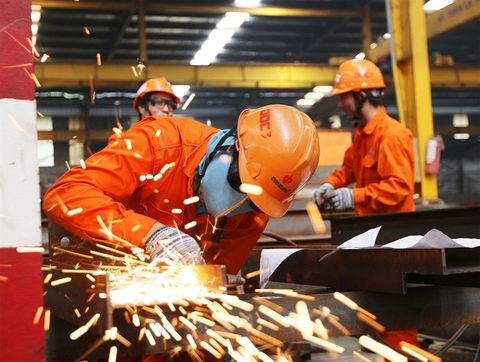
Engineers work in Dai Dung Mechanical Electrical Joint-Stock Company's factory. Despite COVID-19, Viet Nam’s economy has remained resilient, with growth being projected at 6.5 per cent in 2021. — VNA/VNS Photo Thanh Vu
The rapid suppression of the new COVID-19 outbreak in late January 2021 has helped maintain Viet Nam’s positive outlook for economic recovery this year, the World Bank (WB) has said.
In its latest Viet Nam Macro Monitoring Report, the WB said looking ahead, special attention should be paid to how COVID-19 vaccinations will be rolled out domestically and globally as they will impact the pace of Viet Nam’s economic growth. Further fiscal and monetary policy interventions may be needed to support the recovery of private demand.
According to the WB, the Vietnamese Government quickly introduced strict but targeted measures to suppress this new outbreak of COVID-19 in Hai Duong Province, the epicentre, including during the Tet (Lunar New Year) holidays.
As a result, the number of new cases started decreasing, and restrictions were partly eased in the second half of February.
In the meantime, Viet Nam has approved three types of vaccines. The Government also approved a resolution to purchase a total of about 150 million doses of COVID-19 vaccines, and prioritised recipient groups. The WB noted that industrial production slowed as factories closed in observance of the Tet holidays.
The industrial production index dropped by 7.2 per cent year-on-year in February. This decline is mainly reflecting the cross-year difference in the timing of the Tet holidays. The two-month moving average still registered an increase of 8.8 per cent year-on-year in the first two months of 2021.
Viet Nam’s merchandise exports fell by 4.2 per cent year-on-year while imports grew by 11.8 per cent year-on-year in February, resulting in the first month of trade deficit since April 2020.
Preliminary data show that exports to the US and China rose while those to the EU, ASEAN, the Republic of Korea and Japan decreased. The increase in imports was driven by a doubling of imports from China in February 2021 compared to the same period last year, mirroring January 2021 import patterns.
Resilience
Meanwhile, in its latest annual assessment of Viet Nam’s economy last week, the International Monetary Fund (IMF) said despite COVID-19, Viet Nam’s economy has remained resilient, with growth being projected at 6.5 per cent in 2021, thanks to strong economic fundamentals, decisive containment measures and well-targeted government support.
Viet Nam's GDP expanded by 2.9 per cent in 2020 – one of the highest growth rates in the world.
Going forward, the IMF said it is imperative for policymakers to limit economic scarring and support a robust recovery while setting the stage for reforms to boost productivity and reduce economic dualism.
It suggested the Vietnamese Government maintain supportive policies in 2021 to ensure a resilient and inclusive recovery. Policies in the near-term should centre on sustaining employment while fostering a reallocation of resources.
Possible measures include hiring subsidies and active labour market policies to incentivise job training. Coverage of the existing social safety net should be permanently scaled up and its efficiency improved. Over time, policies should aim at reducing labour informality by improving labour skills and lowering hiring/firing costs for formal workers, and encouraging firm formalisation.
Besides, more decisive reforms are needed to make the most of Viet Nam’s growth potential, which would require tackling the sources of low productivity.
Priority should be given to improving the business environment and ensuring a level playing field for small and medium-sized enterprises, with reforms aimed at reducing the regulatory burden faced by firms, improving their access to resources, enhancing governance and access to technology and innovation, and reducing skills mismatches.
"Reforms in these areas would also help Viet Nam reap greater benefits from participation in global value chains in the post-pandemic world," the report said.
The Ministry of Finance proposal for the second round of tax and land rental deferrals is being discussed by the cabinet. The total size of the package was estimated at VND115 trillion (nearly US$5 billion). — VNS